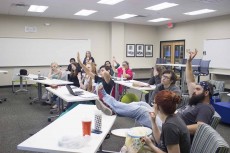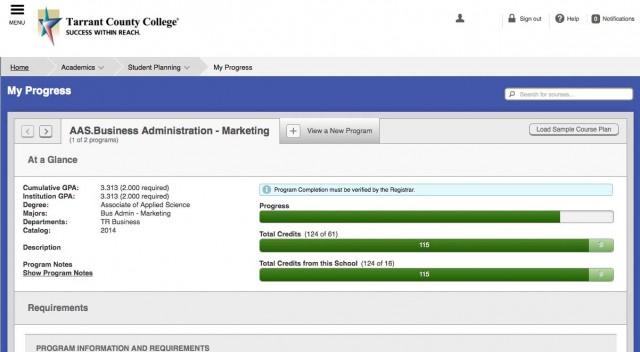By Martin Ramirez/ south news editor

Prakash Sedhain/The Collegian
South Campus’ Script will celebrate its 30th anniversary this semester with a special issue featuring work from current and former students and faculty.
Script, the journal of literature and art for South, was founded in 1986 and is published once per academic year. Previously, English faculty members volunteered as editors for the journal. Since the Fall 2014-Spring 2015 issue, Script is entirely selected, edited and assembled by student editors and faculty editor Logen Cure.
Cure is in charge of Academic Cooperative-ENGL 2389, a class where students gain hands-on work experience as the editorial staff of Script. The first class began last spring and led to Script becoming run by students.
“It’s a platform for South students and artists,” she said. “It was edited by staff members for 28 years when it was first established. It really became student edited just last year.”
For its 30th anniversary, Script will print a retrospective section as well as one for its former faculty members. Student editors are excited to see how the finished product will turn out.
Student editor Dakota Keeton has been a part of Script since its first year as a student-edited issue.
“It helps people make connections,” he said. “It gives student writers a place to start.”
Student editor Amanda Fralicks is passionate about the journal and has high hopes for its publication.
“We make art — arty-art art,” she said. “I would like it to both transcend the dimensions of time and space.”
Script is fueled by South student submissions. Its staff’s job is to spread the word and encourage students to submit. Unfortunately, the task is tougher than it sounds.
“That’s one of our challenges: awareness. There were several classes where I visited, and no one knew what Script was,” Cure said. “I think people are not aware of the full benefits — honorarium — that it provides them.”
Student editor Danyelle Casterline has her opinion on the reason behind students not submitting and Script’s lack of exposure.
“They’re afraid of getting rejected,” she said. “I think it’s one of the major things that should be highlighted. I talk about [Script] all the time.”
Another student editor, Krystal Arredondo, said one of Script’s obstacles is disbelief that it’s student-run.
“Some think it’s not really a student-edited publication,” she said. “We’re constantly going and fighting to get submissions.”
Fortunately, submissions have been coming in. The submissions are chosen blindly. Neither the students nor Cure know who submit them until after they’ve been selected for the issue.
Student editor Jacy Stone said it looks like the upcoming issue will be the biggest one published.
“I think it could potentially be our best issue,” she said. “I hope that it will introduce the world to many new artists.”
Cure said working with her students is a neat experience since many of the editors have different kinds of backgrounds.
“We have a really good team,” she said. “[The student editors] see beauty and value in things that I sometimes miss.”
The students’ diversity also causes arguments since they have various viewpoints and opinions on what should be in Script.
“We have diverse passions,” Arredondo said.
Casterline agreed.
“We are all so invested, and we all have so many opinions,” she said. “But at the same time, that’s kind of like our strong suit — that we are all different.”
Working for Script has allowed student editor Hannah Reed to learn from her peers and has changed her viewpoint on art.
“I like it. I really do,” she said. “I have really high standards on what art should be. Working for Script has helped me open up and change my judgment on what [art and poetry] can be.”
Student editors hope Script will accomplish its goal: “to provide an outlet for the most creative and passionate student minds of the TCC South Campus.”
Although the deadline for inclusion in this year’s issue has passed, Script accepts submissions year-round. For more information about Script, enrollment in ENGL 2389 or submissions, contact Cure at kari.cure@tccd.edu.


























